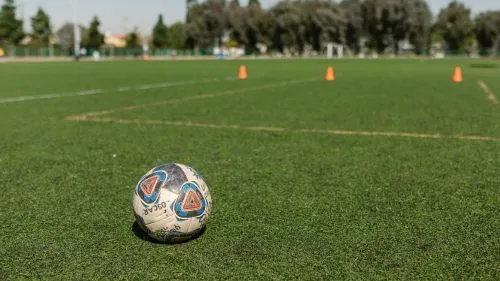Getting anxious before games makes sense—but getting anxious before practice? That can be frustrating and confusing.
Yet, it’s incredibly common. In fact, when I was in college, I would get equally as anxious before practice as I would for games.
And it wasn’t just a little nerves—it messed with my performance, my mindset, and most of all, it messed with the trust I had in myself.
So in this article, I want to walk you through exactly why practice anxiety happens and, more importantly, how to reduce it.
Why Do Athletes Get Anxious Before Practice?
You might think it’s silly to feel anxious before practice. But there are actually a few solid reasons why it happens:
- You want your teammates to think you’re good.
- You want to impress your coaches.
- You’re trying to earn playing time or secure your starting spot.
All of that pressure adds up. And instead of using practice as a place to improve, you start treating it like a performance.
That’s exactly what happened to me.
My Story: Anxiety During Fall Practices
During my freshman year of college baseball, I started fall ball with high hopes. But something strange happened: I began feeling more anxious than I ever had before—especially during ground ball drills.
I wasn’t scared of the ground balls themselves. I was terrified of messing up. I wanted so badly to impress my coaches and teammates.
I wanted to start, and I knew every practice was being watched. That stress led to mistakes. Eventually, I was moved from shortstop to third base—not because I lacked skill, but because anxiety was ruining my ability to play.
This same thing happens to athletes I work with today. I’ve worked with high school quarterbacks trying to win the starting job. I’ve worked with players terrified of losing their current role.
The pressure leads to anxiety, and anxiety leads to poor performance.
3 Steps to Manage Anxiety Before Practice
If I could sum it up simply: we get anxious during practice because we forget that practice is for improvement.
We start seeing it as another game. Another chance to prove ourselves. And while it’s true that coaches are evaluating us, treating practice like a test does more harm than good.
When you show up thinking:
- I can’t make mistakes
- I have to be perfect
- I need to impress coach
…you’re setting yourself up for anxiety.
Step One: Set Practice Objectives
To combat practice anxiety, you need to regain the improving mindset. A great way to do this is by setting practice objectives—simple, controllable goals that help you focus on improvement.
Example:
If I could go back to my college self, I would’ve asked:
- “What do I want to work on today?”
Say we were doing ground balls again. I might choose to focus on:
- Watching the ball all the way into my glove
- Getting around the ball with my feet
That small change would’ve shifted my attention away from impressing others and toward something I could control.
Try this yourself:
- Pick 1–2 things to focus on each practice.
- Make them specific and within your control.
- Let those objectives guide your mindset.
Step Two: Let Go of Perfectionism
Perfectionism and anxiety go hand in hand.
If you expect to be perfect, you will fear every small mistake. And when that mistake happens (because it will), you feel like a failure.
This triggers even more anxiety and spirals into self-doubt.
So instead of demanding perfection, shift your mindset:
- Accept that mistakes will happen
- Use mistakes as feedback
- Focus on effort and improvement
When you let go of perfectionism, you remove a huge source of anxiety. And ironically, you’ll probably perform better too—because you’ll feel more free and relaxed.
Step Three: Create a Pre-Practice Routine
This tip might sound like it contradicts the others, but it doesn’t. Even though practice isn’t a performance, you still want to approach it intentionally.
Just like I work with athletes to build pregame routines to manage nerves and increase confidence, I recommend building a pre-practice routine to help reduce anxiety.
Your routine can be short—it’s the intent that matters.
Ideas for a Pre-Practice Routine:
- 30 seconds of deep breathing to calm your mind
- Review your practice objectives for the day
- Self-talk affirmations like: “Mistakes are okay. I’m here to get better.”
- Brief visualization of you performing well and bouncing back from mistakes
Even 1–2 minutes of focused mental prep can make a huge difference in how you start practice.
If you have more time, you can go deeper:
- 5–10 minutes of mindfulness meditation
- Reading a full list of self-talk statements
- Detailed visualization sessions
But again, the key is intent—not length.
Final Thoughts
If you’re dealing with anxiety before practice, you’re not alone. I’ve been there. The athletes I work with have been there. And it’s not something to be ashamed of.
But it is something you can work through.
Here’s how:
- Shift your mindset back to improvement.
- Let go of perfectionism.
- Build a pre-practice routine.
These steps will help reduce anxiety and improve performance. Not just in practice, but in games too—because the confidence you build in practice carries over.
If you want help working through practice anxiety or other mental game challenges, I offer a 12-week one-on-one mental performance coaching program.
I’ve also created two online courses:
And if you’re more of a reader, check out my books:
Thank you for reading and I wish you the best of success in all that you do.




